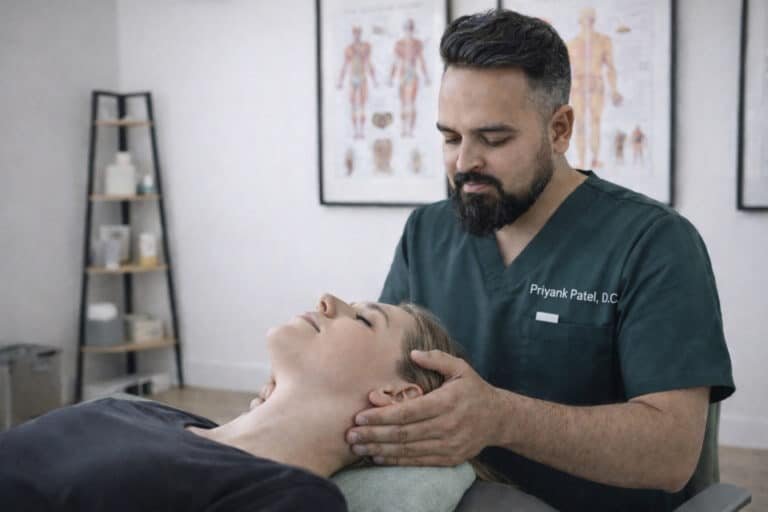Your spine supports you through every moment of your day, yet many of our everyday spine health habits unknowingly cause damage that accumulates over time. At Brooklyn Chiropractic Care, we see patients daily who suffer from back pain caused by seemingly innocent activities. Understanding these harmful patterns is the first step toward better spinal health.
The Hidden Dangers in Your Daily Routine
Modern life presents unique challenges to spine health habits. Research shows that common activities like sitting at a desk, using smartphones, and even sleeping in certain positions can create significant spinal stress. These habits often go unnoticed until pain becomes chronic and debilitating.
1. Prolonged Sitting with Poor Posture
Slumped sitting posture during extended sedentary periods increases gravitational load on lumbar discs and posterior spinal ligaments, leading to reduced lumbar lordosis and increased intradiscal pressure [1][2][3]. This static loading causes creep deformation in spinal tissues, resulting in diminished nutrient diffusion to intervertebral discs and progressive ligamentous laxity [2][5].
When you maintain poor posture for hours, your spine health habits deteriorate rapidly. The rounded shoulders and forward head position common in desk work create a cascade of problems throughout your entire spinal column. For complete strategies to combat these issues, check out our guide on desk job relief exercises.
2. Excessive Smartphone Use
Forward head posture during smartphone use creates a lever arm effect where every inch of anterior head translation increases cervical load by 10 pounds. This posture strains the suboccipital muscles and cervical facet joints, causing myofascial trigger points and joint capsule inflammation [6][7][11].
The modern epidemic of ‘text neck’ represents one of the most damaging spine health habits affecting millions worldwide. Your cervical spine wasn’t designed to support your head in this forward position for extended periods. Learn more about how poor posture connects to neck pain and discover effective solutions.
3. Inadequate Physical Activity
Sedentary behavior reduces paraspinal muscle perfusion by 30-40%, causing metabolic waste accumulation and muscle stiffness. This hypomobility decreases proprioceptive input to spinal stabilizing systems, leading to movement coordination deficits [2][4].
Physical inactivity ranks among the most destructive spine health habits. Your spinal muscles require regular movement to maintain strength and flexibility. Without adequate activity, these supporting structures weaken, leaving your spine vulnerable to injury during even simple movements.
4. Poor Sleeping Posture
Prone sleeping increases lumbar extension by 15-20 degrees beyond neutral alignment, creating sustained facet joint compression and ligamentum flavum stretch. This position increases intradiscal pressure by 25% compared to side-lying positions [14].
Your sleeping position significantly impacts your spine health habits. Many people unknowingly sleep in positions that stress their spinal structures for 6-8 hours nightly. Proper sleep positioning is crucial for spinal recovery and overall wellness.
5. Heavy Backpack Carriage
Loads exceeding 15% body weight shift the center of gravity posteriorly, requiring 20-30% greater erector spinae activation to maintain upright posture. This creates compressive forces up to 1.5 times body weight on lumbar segments during gait [19].
Whether you’re a student or professional, carrying excessive weight on your back represents one of the most overlooked spine health habits. The cumulative effect of heavy loads creates chronic stress on spinal structures, leading to pain and dysfunction over time.
Key Takeaways for Better Spine Health
- Set 30-minute movement alarms during sedentary work to interrupt static loading cycles
- Maintain smartphone at eye level using document holders to keep cervical neutral position
- Incorporate 2-minute thoracic extension exercises every hour to counteract flexion dominance
- Use contoured pillows maintaining 15-20° cervical flexion during side-sleeping
- Distribute backpack weight using waist straps and limit loads to <10% body weight
Frequently Asked Questions
How long does it take to see improvement after changing these spine health habits?
Most patients notice improvements in pain and mobility within 2-4 weeks of consistently implementing better spine health habits. However, tissue healing and postural changes typically require 6-12 weeks of sustained effort.
Can poor spine health habits cause permanent damage?
While some degenerative changes are irreversible, most spine health habits-related problems can be significantly improved with proper intervention. Early recognition and treatment prevent permanent damage in most cases.
Which spine health habits cause the most damage?
Prolonged sitting with poor posture and excessive smartphone use typically cause the most immediate problems. These habits create the greatest stress on spinal structures and are most difficult to avoid in modern life.
How often should I take breaks from sitting?
Research supports taking movement breaks every 30 minutes during prolonged sitting. Even 2-3 minutes of standing and gentle stretching can significantly reduce spinal stress and improve your spine health habits.
What’s the best sleeping position for spine health?
Side-sleeping with proper pillow support maintains the most neutral spinal alignment. Avoid stomach sleeping, which forces your neck into rotation and increases lumbar extension beyond healthy limits.
Can chiropractic care help reverse damage from poor spine health habits?
Chiropractic treatment effectively addresses many problems caused by poor spine health habits. Through spinal adjustments, soft tissue therapy, and corrective exercises, we can restore proper function and reduce pain significantly.
Recognizing and changing harmful spine health habits is essential for long-term spinal wellness. These seemingly minor daily activities create cumulative stress that eventually manifests as chronic pain and dysfunction. By understanding how your routine affects your spine, you can make informed choices that support rather than sabotage your spinal health.
The path to better spine health begins with awareness and commitment to change. Small modifications to your daily spine health habits can yield significant improvements in pain, function, and overall quality of life. Don’t wait until pain becomes severe to address these issues.
Ready to find relief? Schedule an appointment online or visit us at Brooklyn Chiropractic Care, 112 Greenpoint Ave. STE 1B, Brooklyn, NY 11222. Experience relief, Embrace Wellness!
References
- [1] https://pmc.ncbi.nlm.nih.gov/articles/PMC7822118/
- [2] https://academic.oup.com/pmj/article/101/1197/620/7944093
- [3] https://www.frontiersin.org/journals/sports-and-active-living/articles/10.3389/fspor.2021.760533/full
- [4] https://pubmed.ncbi.nlm.nih.gov/40338112/
- [5] https://pmc.ncbi.nlm.nih.gov/articles/PMC6267109/
- [6] https://pubmed.ncbi.nlm.nih.gov/37405530/
- [7] https://www.physio-pedia.com/Text_Neck
- [11] https://pmc.ncbi.nlm.nih.gov/articles/PMC9982850/
- [14] https://journals.plos.org/plosone/article?id=10.1371%2Fjournal.pone.0160037
- [19] https://pmc.ncbi.nlm.nih.gov/articles/PMC2528269/


